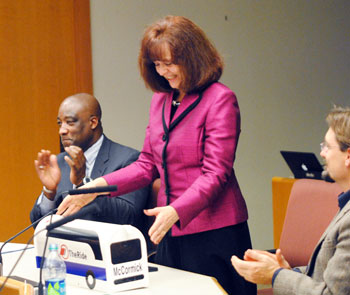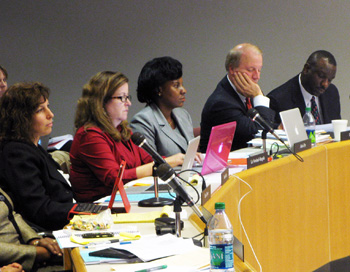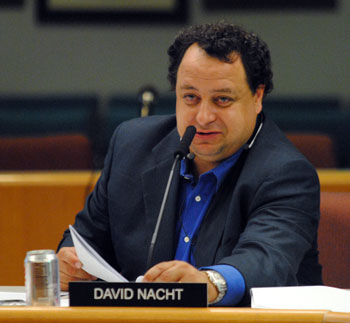DDA Acts on Infrastructure, Governance
Ann Arbor Downtown Development Authority board meeting (July 2, 2014): Much of this month’s meeting was devoted to infrastructure projects and organizational matters, as the DDA board restructured its committees and elected new officers for fiscal 2015, which began on July 1.

From left: DDA board members Bob Guenzel, Sandi Smith, John Mouat. Smith officiated her last meeting as chair on July 2, and Mouat was elected to serve as chair for fiscal 2015, which began on July 1. (Photos by the writer.)
The board approved a $390,000 grant related to an extended-stay hotel project on the downtown’s west side. The development is by First Martin Corp. at 116-120 W. Huron – the intersection of Huron and Ashley streets. The grant will be used to pay for a new 12-inch water main, sidewalk improvements along Ashley, and landscape maintenance in the public right-of-way.
This was the first grant awarded after the board adopted a grant policy earlier this year.
The board also gave a one-year extension to a previously-awarded $650,000 brownfield grant for the 618 S. Main apartment complex. It was originally awarded in 2012, but the project is not yet completed – in part because of the recent harsh winter. The funds would help pay for upsizing a water main to 12 inches, as well as streetscape improvements and a rain garden for stormwater management.
Also related to infrastructure, the board established a project budget of $100,000 for tree maintenance and sidewalk repairs in downtown Ann Arbor in fiscal 2015.
Related to personnel issues, the board held a closed session to evaluate Susan Pollay, the DDA’s executive director. After about 15 minutes, the board emerged and voted to give Pollay a 5% raise, increasing her salary from $109,119 to $114,570.
In describing the rationale for the raise, Roger Hewitt noted that Pollay had received “good raises” in the last two years, but for the six years before that she had not received a raise because of the difficult economy. Her position as a city employee is in the Level 2 category, which has a salary range from $95,000 to $157,000. Several board members indicated a desire to move Pollay toward the midpoint of that range over the next few years. Sandi Smith characterized it as “catch up” to compensate for the years when Pollay didn’t get a raise. Hewitt said the intent is to bring her up to that midpoint salary of $126,000 “within a fairly short time period.”
Casting the sole vote against the 5% increase was city administrator Steve Powers, who said he’d be more comfortable with a 3% raise, and hoped there would be a more robust evaluation process in the future.
Immediately after its regular monthly meeting, the board held its annual meeting to elect officers for the coming fiscal year. John Mouat was unanimously elected to serve as chair of the board. Other officers are Roger Hewitt (vice chair), Rishi Narayan (treasurer), and Keith Orr (secretary). Outgoing chair Sandi Smith was thanked for her service, and received a gift from staff – a small pin from the former Selo/Shevel Gallery, which Pollay indicated evoked a cityscape of tall buildings. Pollay said it was inspired by a trip that several DDA staff and board members took last year to New York City for the International Downtown Association conference.
Also at the July 2 meeting, the board dissolved its two existing committees and created four new committees: (1) marketing, (2) partnerships/economic development, (3) finance, and (4) operations (parking/transportation/construction).
In supporting the idea of a separate marketing committee, Narayan noted that if a staff member is hired to focus on marketing and communications, “this area might become more fleshed out very quickly.” Previously, a marketing subcommittee had been part of the partnerships committee. The new finance committee was created in part in anticipation of the DDA’s growing budget, and a desire for more financial oversight.
During updates, Hewitt reported that work continues on a possible north/south commuter rail between Ann Arbor and Howell known as WALLY – the Washtenaw and Livingston Line. A recommendation will be coming soon to locate a stop on the east side of the railroad tracks between Liberty and Washington streets, opposite of the former city maintenance yard. He stressed that this transportation service is probably a significant way off from being offered. If the project moves forward, the recommended stop wouldn’t be a full station – it would simply be a platform with canopies, and would be built entirely within the railroad right-of-way. Hewitt plans to make a short formal presentation about the recommendation at a future DDA board meeting.
Also related to transportation, Orr reported that the new Greyhound ticket office at the Fourth & William structure will be opening next week – ahead of schedule. Next week also will be the grand opening of the nearby Blake Transit Center, operated by the Ann Arbor Area Transportation Authority.
In other updates, Hewitt noted that members of the DDA’s operations committee continue to work on a downtown ambassadors program, and are likely to bring two potential service providers in for interviews by the end of this summer. [Full Story]






